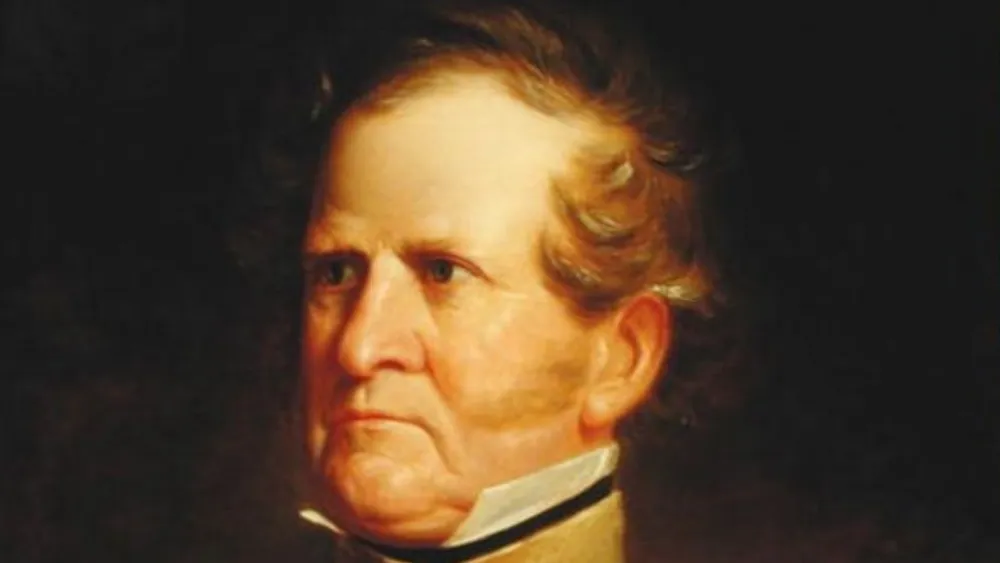Winfield Scott, famously nicknamed “Old Fuss and Feathers,” was a towering figure whose unwavering dedication to military discipline and meticulous attention to detail shaped American military history across generations. His illustrious career spanned more than half a century, covering some of the nation’s most defining conflicts, from the War of 1812 to the Mexican-American War and the dawn of the Civil War. Through triumphs and trials alike, Scott earned a reputation not only as a brilliant tactician but as a principled leader who set high standards of conduct and professionalism for the United States Army.
His impact on military theory and battlefield strategy was profound, and his legacy continues to inspire soldiers, historians, and leaders to this day. But behind the polished uniform and stern demeanor was a man whose journey began humbly in rural Virginia, driven by an unshakable determination to serve his country and leave an enduring mark on its destiny.
From Modest Beginnings to Military Ambitions
Winfield Scott’s story began on June 13, 1786, in Petersburg, Virginia. Born into a family of limited means, he grew up amid the uncertainties and hardships of post-Revolutionary America. His childhood offered only a modest education, but young Winfield possessed an innate curiosity and a deep fascination with military affairs. As a boy, he listened to stories of the Revolution and admired the figures who had fought for independence. These early influences planted a seed that would eventually shape his ambitions.
Despite his early passion for military service, Scott initially chose a more conventional path. At just 16 years old, he began studying law, envisioning a stable professional future. However, the lure of the battlefield proved too strong to resist. In 1808, when he was barely 22, Scott abandoned his legal pursuits and enlisted in the United States Army. This decision marked the first decisive step in a journey that would propel him to the pinnacle of military leadership.
From the outset, Scott’s military career was marked by challenges that tested his resolve. He faced harsh conditions, a lack of supplies, and an army still struggling to define itself in the fledgling nation. Yet these formative experiences forged in him the resilience, resourcefulness, and discipline that would become the hallmarks of his leadership.
His early years mirrored the broader American struggle for stability and identity, and as he advanced through the ranks, Scott’s personal story became inseparable from the country’s evolving narrative. His life is a testament to the power of perseverance and the extraordinary impact a single individual can have on the course of history.
Proving His Mettle: The War of 1812
While Scott would later be celebrated for his achievements in the Mexican-American War, it was during the War of 1812 that he first demonstrated his exceptional leadership under fire. Promoted rapidly due to his competence and courage, Scott led troops in several pivotal battles. He was wounded and captured during the Battle of Queenston Heights but was soon paroled. His conduct earned him respect among peers and superiors alike.
Scott’s insistence on strict discipline and his efforts to professionalize the army earned him the moniker “Old Fuss and Feathers.” Though some criticized his focus on precise uniforms and drill, Scott believed that a disciplined, well-trained army was essential for victory. History would ultimately vindicate his philosophy.
The Commands of Winfield Scott in the Mexican-American War
Perhaps no period in Scott’s career better showcased his tactical brilliance than the Mexican-American War (1846–1848). As the United States expanded westward, tensions with Mexico erupted into open conflict. President James K. Polk appointed Scott to lead the main American expeditionary force in what would be one of the most daring military campaigns of the 19th century.
The assignment was formidable: orchestrate a massive amphibious landing at Veracruz and then march inland to capture Mexico City, the enemy’s capital. Scott’s meticulous planning and innovative strategies proved decisive. In March 1847, he oversaw the largest amphibious assault in U.S. history up to that time, landing thousands of troops safely on the Mexican coast.
From Veracruz, Scott led a grueling campaign through challenging terrain and against fierce resistance. His victories at Cerro Gordo, Contreras, and Churubusco demonstrated his ability to outmaneuver larger forces and exploit enemy weaknesses. Throughout the campaign, Scott balanced aggressive tactics with careful logistics and respect for civilian populations—a remarkable feat in an era when war often brought devastation to noncombatants.
His crowning achievement came in September 1847, when American forces captured Mexico City after intense street fighting. The fall of the capital effectively ended the war, forcing Mexico to negotiate a peace treaty that ceded vast territories to the United States.
Equally noteworthy was Scott’s humane treatment of the defeated Mexican army and civilians. By respecting the rights of the vanquished and preserving order in the captured city, he earned admiration both domestically and abroad. His conduct reinforced the idea that military victory need not come at the expense of honor and decency.
Civil War and the Anaconda Plan
While the Mexican-American War secured Scott’s reputation as a master strategist, it was the American Civil War that offered perhaps the greatest test of his wisdom and foresight. By 1861, the nation stood on the brink of collapse. Southern states seceded, forming the Confederacy, and the Union faced an existential crisis.
At nearly 75 years old and suffering from declining health, Scott could have quietly retired. Instead, he remained at his post as General-in-Chief, determined to offer his experience in the Union’s hour of need.
Recognizing that a direct invasion of the South would be costly and potentially disastrous, Scott proposed what he called the Anaconda Plan. The strategy called for a massive naval blockade of Southern ports, coupled with control of the Mississippi River to bisect the Confederacy. The goal was to strangle the South’s economy—just as a constricting snake suffocates its prey—while avoiding the high casualties of head-on assaults.
At first, critics dismissed the Anaconda Plan as too passive. Many Union leaders clamored for an immediate offensive to crush the rebellion swiftly. But Scott knew the Confederacy’s resilience would require a long-term strategy. Over time, elements of his plan became central to Union operations. The blockade weakened the Southern war effort, proving the wisdom of Scott’s vision.
Even after he formally retired in November 1861, Scott continued to offer counsel to President Lincoln and senior commanders. His steady presence, quiet authority, and strategic clarity provided a crucial anchor during the war’s earliest and most uncertain days.
Winfield Scott and His Influence on Civil War Strategy
The Anaconda Plan was first opposed and regarded with skepticism, but it gradually gained support and became a key component of the Union strategy. It was evidence of Scott’s wisdom and capacity to look beyond the battleground. In conjunction with other tactical moves, the blockade was crucial in diminishing the Confederacy’s capacity to continue its war effort.
Winfield Scott was a steady pillar of power who continued to advise governments and affect military strategy even in his later years. His unrelenting dedication to upholding the Union and his creative, strategic thinking significantly impacted how the American Civil War unfolded.
The End of an Era: Winfield Scott’s Retirement
After an astonishing career spanning over 53 years, Winfield Scott’s retirement marked the end of an era. He had served under every president from Thomas Jefferson to Abraham Lincoln and held command during America’s rise from a fragile young republic to a continental power.
Although no longer leading armies, Scott remained an influential figure, revered as the elder statesman of American military affairs. His personal example—strict yet fair, demanding yet compassionate—shaped the ethos of the Army long after he left active service.
He spent his final years reflecting on the extraordinary transformations he had witnessed: the expansion of the nation, the trials of war, and the evolving art of military leadership. He died on May 29, 1866, at the age of 79, leaving behind a legacy that would echo through the generations.

A Towering Legacy of Winfield Scott
Winfield Scott’s contributions went far beyond battlefield victories. He pioneered reforms that professionalized the Army, instilled a culture of discipline, and elevated the standards of conduct for military leaders. His emphasis on precise training and readiness became the foundation upon which future successes were built.
The principles Scott championed—**discipline, accountability, and respect for both allies and adversaries—**still guide the U.S. military today. His visionary strategies, from amphibious warfare in Mexico to the economic siege of the Anaconda Plan, demonstrated a remarkable ability to adapt and innovate. In this way, Scott helped shape the modern concept of total war.
His life also offers enduring lessons about leadership. He showed that strength is not only measured in victories but also in character—the courage to do what is right even when unpopular, the foresight to plan for the long term, and the compassion to treat enemies with humanity.
Conclusion: The Enduring Example of “Old Fuss and Feathers”
From the battlefields of the War of 1812 to the strategy rooms of the Civil War, Winfield Scott’s long and distinguished service exemplifies the finest qualities of an American soldier and statesman. His devotion to duty, unyielding discipline, and innovative spirit left an imprint that shaped the destiny of a growing nation.
Today, his story stands as a powerful reminder of what leadership can accomplish when guided by integrity, vision, and an unwavering commitment to principle. “Old Fuss and Feathers” may have passed into history, but his legacy endures—an inspiring example for military professionals, historians, and all who value the pursuit of excellence.










